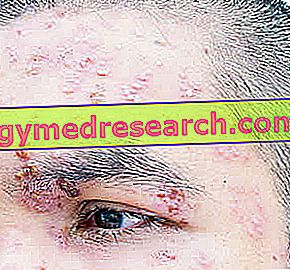Ocular herpes is a disease caused by the Herpes simplex type 1 virus (also involved in cold sores and sometimes in the genital herpes).
It affects the skin and mucous membranes of the eyes. It causes the formation of some vesicles full of serous liquid destined to break or reabsorb. These are subsequently replaced by fragile and tendentially bleeding crusts.

Once contracted, the Herpes infection becomes chronic and cannot be cured permanently. Viruses escape the immune system (SI) and drugs, hiding inside the sensitive nerve ganglia. When the situation becomes favorable (decrease in immunity defenses due to mental stress, general physical and localized), they come out and multiply, causing the above symptoms and clinical signs.
Ocular herpes can be associated with the labial and nasal area; less frequently to genital herpes.
What to do
To avoid the symptoms of ocular herpes it is necessary to act on two fronts:
- Prevention of infection:
- Infection occurs mainly through direct contact between the skin and vesicle fluid. Passage between carriers and healthy people must be avoided.
- The transmission of the pathogen during the latency phase is more rare. However, many infections occur without any apparent assumption. This means that carriers have neglected the first symptoms and have not avoided contact with other people.
- Limit the exchange of personal items such as: towels, soaps, razors, toothbrushes, depilatories, etc.
- It is possible that the susceptibility to herpes viruses is genetically determined. If this were the case, prevention would become less decisive.
- After infection, acute prevention:
- Reduce psychological stress, of any kind and even that which lasts for limited periods.
- Decrease the frequency of general or localized infections.
- Avoid chemical and physical stress on mucous membranes.
- Eat in a balanced way.
- Pay attention to nutrient requirements and the supply of nutritional elements directly involved in supporting the immune system: vitamin C, vitamin D, magnesium, iron, zinc and selenium.
- Increase the global contribution of antioxidant molecules: in addition to vitamin C, also vitamin A, vitamin E, polyphenols, etc. These can counteract the action of free radicals and decrease general oxidative stress.
- Treat omega 3 essential fatty acids: they are anti-inflammatory and stimulate the production of antibodies.
- Consuming probiotic and prebiotic foods: they improve the condition of the intestinal bacterial flora that participates in the tropism of the immune system.
- Eating foods rich in the amino acid lysine: it seems to exert a preventive effect on the infection (the reasons are not known).
- Follow sporting protocols in a costly but reasonable manner: motor activity is able to optimize the natural defenses and the efficiency of the organism. However, an excess can be counterproductive.
- Making use of drugs only after consultation or medical prescription: we must not self-manage drug therapies, especially in the case of antibiotics that harm the intestinal bacterial flora.
- Protect the skin from sunburn, chemical irritation and intense cold.
- With the onset of the first symptoms, use medication promptly.
What NOT to do
The behaviors potentially responsible for the infection with Herpes simplex are:
- Direct physical contact with the serous fluid contained in a patient's vesicles (even if located in parts of the body other than the eyes).
- Ignore the symptoms and fail to alert healthy people.
- Use the personal objects of others (applies to both healthy and sick people).
- Neglect hygiene (especially during activities in close contact with other people).
The elements that can increase the chances of acute outbreaks of eye sores are:
- Mental stress: compromises the immune system and allows viruses to exit the ganglia and replicate.
- Ignoring other infections: although not serious, they create a situation favorable to the development of latent viruses.
- Neglecting the maintenance of the immune system:
- develop vitamin and saline deficiencies of the elements involved in the immune formation.
- Take few polyphenolic antioxidants.
- Consume foods implicated in the response to food intolerance: they can increase levels of inflammation or oxidative stress.
- Get in touch with objects or take foods responsible for allergic reactions.
- Follow a diet lacking in prebiotics and probiotics necessary for intestinal bacterial flora.
- Use food supplements with high levels of arginine. Some studies indicate that this amino acid could promote herpes outbreaks.
- Debil the body with inappropriate training programs.
- Inappropriate antibiotics and other medications.
- Expose the eyes (mucous membranes and surrounding skin) to excessive cold or too intense UV rays.
What to eat
Carefully managing the diet is an important factor in the prevention of acute conditions; however, it cannot be considered a remedy.
- Ascorbic acid or vitamin C: peppers, citrus fruits, parsley, kiwi, lettuce etc. Fresh and possibly raw.
- Calciferol or vitamin D: fish, fish oil and egg yolk.
- Zinc: liver, meat, milk and derivatives, some bivalve molluscs (especially oysters).
- Selenium: meat, fishery products, egg yolk, milk and dairy products, fortified foods (potatoes, etc.).
- Magnesium: oilseeds, cocoa and dark chocolate, bran, vegetables and fruits.
- Iron: meat, fish products and egg yolk. Some vegetables contain it, but the shape is not very bioavailable.
- Polyphenolic antioxidants: fresh and raw fruit and vegetables, red wine, oily and starchy seeds, spices, tea, roots, medicinal herbs etc.
- Lysine: meat, cheese, some fishery products and legumes (in particular soy).
- Probiotics: fermented foods such as yogurt, tofu, tempeh, buttermilk etc. Prebiotics, on the other hand, are molecules of plant origin belonging to the group of carbohydrates (available and not available to humans, fibers).
- Omega 3: fish (especially blue and fat), some oily seeds and related oils (flax, kiwi, grape seeds etc.) and algae.
What NOT to Eat
The eating behaviors to be avoided are:
- Monothematic diets.
- "Do it yourself" vegan diet.
- Diet free of vegetables and vegetables.
- Diets based solely on:
- Cooked foods.
- Preserved foods.
- Use of food supplements based on arginine.
Natural Cures and Remedies
Again we stress that there are no definitive remedies for ocular herpes.
Nevertheless, some natural products can help maintain an efficient immune system:
- Echinacea and other immunostimulating plants.
- Royal jelly.
- Propolis (for oral and topical use).
Pharmacological care
Even with regard to drugs, there are no known definitive remedies for the treatment of ocular herpes today. The available products are considered a temporary and palliative solution.
These therapies are mainly used for:
- Moderate symptoms.
- Blocking viral multiplication.
- Promote healing.
The drugs used for ocular herpes are:
- Acyclovir (or similar): cream for topical use or tablets for oral use; reduces the replicative capacity of viruses.
- Zinc and / or heparin in cream for topical use: they reduce the time of the rash.
- Interferon: powerful antiviral action.
- Immunostimulants: especially natural or synthetic thymic hormones, stimulate immune production.
- Antihistamines: they act against itching.
Prevention
The most indicated remedy is prevention, which can involve primary infection in healthy subjects or the onset of acute conditions in carriers of the virus.
- Prevention of infection: it requires many precautions both from healthy people and from those who are sick.
- Prevention of acute symptoms: reducing general stress, ensuring the functioning of the immune system (including nutritional status), avoiding falling ill repeatedly or sensitizing the mucous membranes of the eyes and the surrounding skin excessively.
Medical treatments
There are no total remedies against ocular herpes, neither of pharmacological origin, nor of any other medical nature.
It is advisable to limit yourself to: preventing contagion, preventing the onset of acute and possibly using dedicated drugs.



